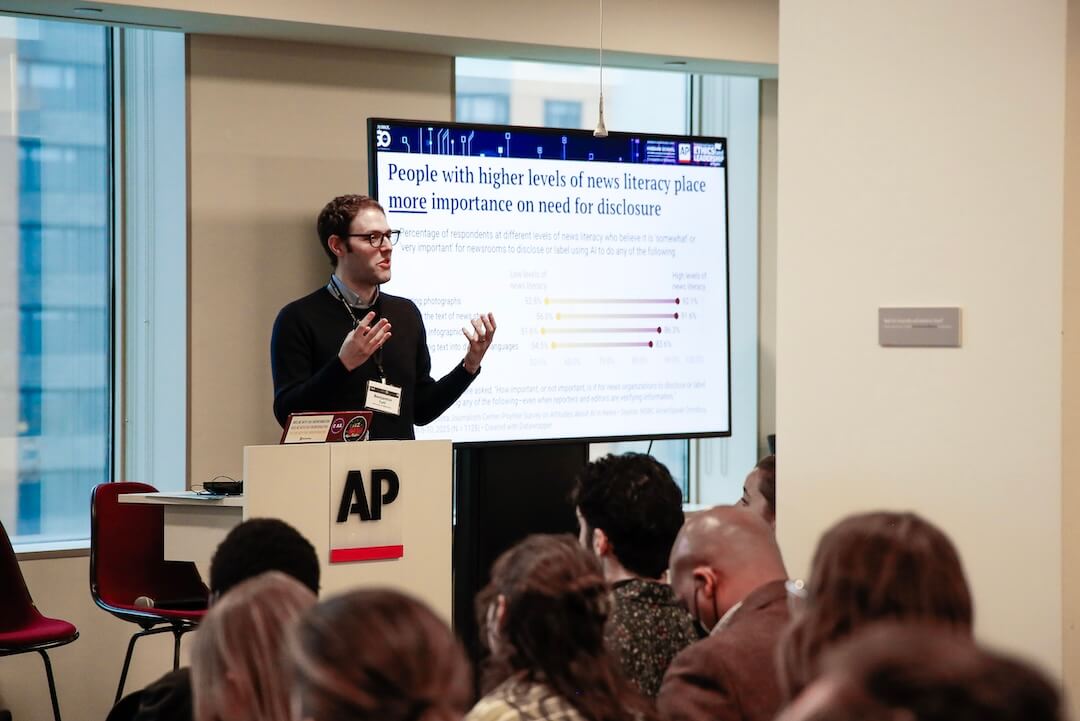Factually is a newsletter about fact-checking and misinformation from Poynter’s International Fact-Checking Network & the American Press Institute’s Accountability Project. Sign up here.
Defining moments vs. defining issues
In a rational world, politicians would argue for their candidacies by making reasoned statements about issues and policies, and fact-checkers could then measure those statements against the truth.
Then there is the world we saw in Tuesday night’s debate between President Donald Trump and his Democratic challenger Joe Biden.
It was anything but rational. Amid all the noise, was anyone paying attention to the issues?
To be sure, debates are often not defined by policy, but by standout moments. The Associated Press captured some of them in a story before Tuesday’s event, like the one in 1984 when President Ronald Reagan, asked about his fitness for office at his age (73), said he wouldn’t use Walter Mondale’s (56) “youth and inexperience” against him for political purposes. And remember Mitt Romney’s “binders full of women”?
These moments don’t just sustain pundits and allow political nerds to show off on trivia night. They help define the candidates by exposing their personalities, their judgment and their ability to think on their feet. They’re important. But they’re rarely about the facts.
So why bother with fact-checking, especially in a debate like Tuesday’s, which was rife with such clip-worthy moments?
Because some people are, in fact, still looking to debates for information about the issues – maybe more than we think. One woman in a CNN focus group in Ohio said she was disappointed by all the arguing and crosstalk because she had hoped to learn something about the candidates’ positions.
Instead, she and other viewers were caught in the throes of debate drama, where Trump let loose a firehose of lies and interrupted Biden so often that he provoked the former vice president to say “Would you just shut up, man?”
For fact-checkers, the evening probably felt like a microcosm of the past four years – they’re steadily doing their work, debunking falsehoods and identifying assertions that lack context or contain partial truths, all the while getting overshadowed by atmospherics.
But if you were looking for information on how these politicians performed on the facts, some of the most serious issues journalism could be found in the pieces produced by the fact-checkers at The Washington Post, The New York Times, Bloomberg News, the Associated Press, the Los Angeles Times, CNN, ABC, NBC and CBS, FactCheck.org and (Poynter-owned) PolitiFact.
They stayed laser-focused on the facts even as the evening was focused on something else altogether.
— Susan Benkelman, API
[the_ad id=”667826″]

. . . technology
- The Harvard Kennedy School’s Misinformation Review released a report on how the Internet Archive is being exploited to extend the reach of health misinformation on social media platforms.
-
- The report found that some archived URLs on Facebook got twice the engagement as the original content.
-
- NBC News took a look at how Facebook and Twitter are approaching labels on false assertions by President Trump about mail-in voting.
- The labels, wrote David Ingram, “show how half-measures used by tech companies to try to fight harmful misinformation are bound to fall short of solving the problem.”
. . . politics
- The IFCN’s bilingual WhatsApp chatbot, FactChat, gained three times as many Spanish-speaking users as English speakers in its first week of operation.
- The chatbot is a one-stop-shop for fact-checks about the 2020 election from 10 U.S. based fact-checking organizations, which are translated into Spanish by Telemundo and Univision.
- An investigation by Britain’s Channel 4 revealed that the Trump campaign tried to depress turnout among Black voters in 2016 by using micro-targeted ads to discourage them from voting.
- The campaign used a database of information on nearly 200 million voters to target 3.5 million Black voters for a project called “deterrence.”
. . . science and health
- The New York Times reported that colleges are hiring students as social media influencers helping to get out the word about COVID-19 safety measures on campus.
- The University of Missouri spent $10,300 to hire a Canadian advertising agency to help recruit student influencers, wrote Ezra Marcus.
- Science Magazine reported on an effort by the French government to bring together journalists and scientists to help cut down on the spread of scientific misinformation.
- The goal is to make high-quality information accessible to the public, but government involvement has raised concerns over political independence and journalistic integrity.
[the_ad id=”667872″]

This week’s fact-check looks at a video posted on Facebook claiming to show a Chinese Uighur man being brutalized in a prison camp. China has faced criticism for its treatment of its ethnic Uighur minority, but Indian news outlet and fact-checker NewsMobile looked into this claim and determined the video showed something else entirely.
After breaking the footage into key frames, the team used reverse image search and found copies of the video with titles written in Indonesian. These titles translated to, “Bengal beaten by TNI.” Using a keyword search, NewsMobile discovered “TNI” was an acronym for the Indonesian military rather than the Chinese.
The team also noticed the letters “PKD” written on the helmet of one of the men conducting the beating. Again using a keyword search, NewsMobile found that these letters represented the Indonesian National Police. A further search revealed the video was tied to an Indonesian news article from 2017 about a gangster being beaten by police.
What we liked: This very thorough fact-check does a good job of explaining its work, and showing its audience how to use small visual clues to uncover misinformation. It also serves as a reminder of how viral claims play on emotionally charged issues, which is especially important at a time of heightened tensions between India and China.
— Harrison Mantas, IFCN
[the_ad id=”667878″]

- The IFCN awarded grant funding to five new projects in the second round of its Fact-Checking Innovation Initiative.
- The New York Times reported that a rise in COVID-19 cases in Europe is correlating with a rise in misinformation about the virus.
- Forbes wrote about the high-profile journalists taking part in the MediaWise ambassador program to fight misinformation.
- The BBC’s Marianna Spring reported that the Trump campaign is running hundreds of ads on Facebook pushing the widely debunked conspiracy theory that Democratic Nominee Joe Biden used an earpiece in Tuesday’s debate.
- QAnon is now attracting cops, wrote Mother Jones’ Ali Breland.
Thanks for reading. Feel free to send feedback to factually@poynter.org. And send us your favorite fact-checks! We’d love to hear from you.
If this newsletter was forwarded to you, or if you’re reading it on the web, you can subscribe here.
Until next week,







